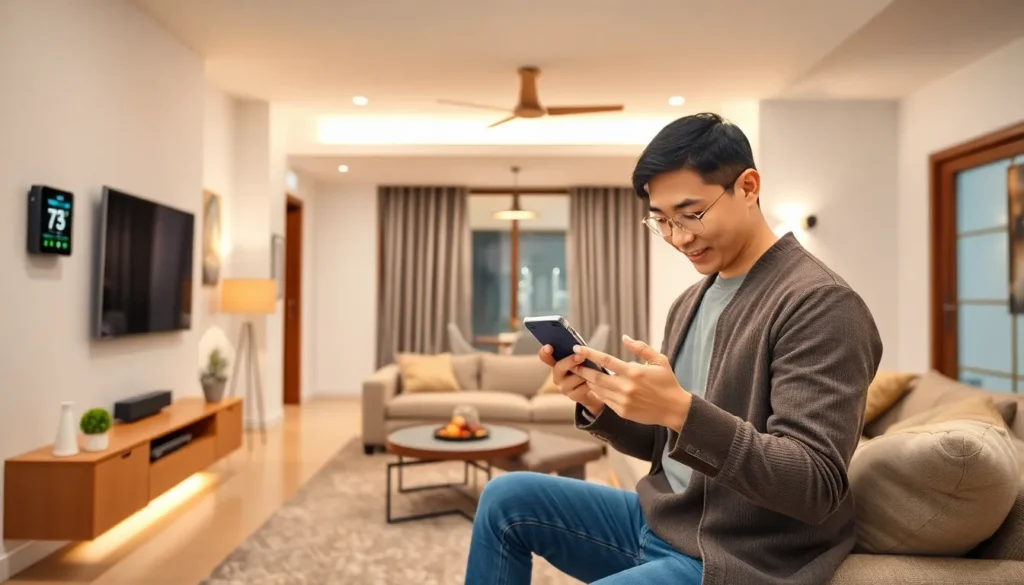Table of Contents
ToggleImagine walking into your home and having the lights turn on, the coffee brewing, and the thermostat adjusting to your perfect temperature—all without lifting a finger. Sounds like magic, right? Welcome to the world of home automation systems, where technology meets convenience in a way that even your cat might be impressed.
These systems aren’t just for tech enthusiasts or the ultra-wealthy; they’re becoming an essential part of modern living. From smart speakers that play your favorite tunes to security cameras that keep an eye on things while you binge-watch your favorite shows, home automation is all about making life easier and a bit more fun. So buckle up and get ready to explore how turning your home into a smart haven can save time, energy, and maybe even a little sanity.
Overview of Home Automation Systems
Home automation systems integrate various devices to create a seamless environment within a residence. These systems enable users to control features such as lighting, heating, and security, often through smartphones or voice commands.
Devices include smart thermostats, security cameras, and smart lights. Each device connects to a central hub, allowing for easy management and synchronization. Temperature adjustments are automated based on user preferences, ensuring comfort at all times.
Remote access empowers homeowners to monitor their properties from anywhere. Alerts sent to smartphones enhance security, so residents receive notifications about unexpected activities. Such proactive measures reduce the risk of burglary or damage.
Energy efficiency stands as a key benefit of home automation. Smart devices optimize energy consumption, resulting in lower utility bills. For example, smart thermostats adjust heating and cooling schedules based on occupancy, preventing unnecessary energy use.
User interfaces vary from voice commands to mobile applications. Voice assistants like Amazon Alexa or Google Assistant simplify operations, making smart homes more accessible. App-based controls offer real-time updates and settings customization.
Seamless integration is essential for effective home automation. Compatibility among devices ensures a cohesive system, allowing for automation of different tasks from a single command. Homeowners often find that combining multiple devices enhances functionality.
Customization options cater to individual preferences. Users create unique automation scenarios, such as scheduling lights to dim at night or activating security systems when leaving home. Such personalization contributes to an improved quality of life.
Overall, home automation systems represent a significant advancement in technology, enhancing convenience and security. The evolution of these systems continues to make smart homes more appealing to a broader audience.
Benefits of Home Automation

Home automation systems offer several advantages that enhance daily living. Users experience increased convenience, energy efficiency, and enhanced security.
Increased Convenience
Convenience becomes a primary benefit of home automation. Smart devices enable effortless control of various features, such as lights, appliances, and climate settings, often through smartphones or voice commands. Homeowners set schedules, so the coffee brews each morning automatically. Additionally, remote access allows adjustments from anywhere, whether at work or on vacation. This flexibility makes it easy to manage everyday tasks, improving overall quality of life.
Energy Efficiency
Energy efficiency stands out as another major gain. Smart thermostats optimize heating and cooling based on occupancy patterns, significantly lowering utility bills. Devices communicate with each other to minimize energy waste, turning off lights or appliances when not in use. Homeowners benefit from monitoring energy consumption in real-time, leading to informed decisions about usage. These efficiencies not only save money but also contribute positively to the environment.
Enhanced Security
Security enhancements play a crucial role in home automation. Smart cameras and motion detectors provide real-time alerts about unusual activities, ensuring peace of mind. Homeowners monitor their properties remotely, checking feeds from security cameras at any time. Automated locks permit entry only through authorized devices, creating an added layer of protection. This comprehensive security approach helps prevent break-ins and fosters a safer living environment for families.
Types of Home Automation Systems
Home automation systems come in various forms, each designed to enhance specific aspects of daily living.
Smart Lighting
Smart lighting comprises fixtures and bulbs connected to a network. Users control lighting through smartphones, voice commands, or automated schedules. With dimmable options, these systems allow customization based on mood and time of day. Energy-saving features reduce consumption significantly, leading to lower electricity costs. Homeowners can also opt for motion sensors, ensuring lights activate only when needed.
Climate Control
Climate control systems manage heating, ventilation, and air conditioning to optimize comfort. Smart thermostats adapt to users’ preferences, adjusting temperatures based on occupancy patterns. By analyzing data, they promote energy efficiency while maintaining ideal indoor climates. Remote access through apps offers real-time monitoring and adjustments, providing convenience when away from home. Some models even support geofencing technology, automatically adjusting settings based on user location.
Security Systems
Security systems integrate various devices to enhance protection. Smart cameras and doorbells offer real-time video feeds, enabling homeowners to monitor their properties remotely. Motion detectors alert users to potential intrusions, increasing overall safety. Many systems can be customized with alarm responses and scheduled alerts, offering flexibility for individual needs. Integration with other home automation devices allows comprehensive control through a single platform, streamlining user experience.
Entertainment Systems
Entertainment systems provide seamless access to audio and video content. Smart speakers enable voice control of music, podcasts, and streaming services. Users can create customized playlists and synchronize devices across multiple rooms for a unified experience. Smart TVs and streaming devices allow effortless navigation and on-demand content availability. Automation can extend to managing light and temperature settings, creating an immersive atmosphere for movie nights or parties.
Choosing the Right Home Automation System
Selecting a home automation system requires careful consideration of various factors. Understanding individual needs shapes the selection process, ensuring the system enhances daily life.
Assessing Your Needs
Identifying specific requirements is essential. Focus on features like security, energy efficiency, and convenience. Determine whether remote access is important, as this enables monitoring from anywhere. Tailoring the system to personal preferences ensures satisfaction. For instance, some homeowners prioritize automated lighting and climate control, while others seek advanced security features. Thoroughly evaluating needs streamlines the decision-making process.
Budget Considerations
Establishing a budget helps narrow down options. Systems vary significantly in price, from basic setups to comprehensive solutions. Often, initial costs include the purchase of devices and installation. Ongoing expenses may arise from subscription services or additional device purchases. It’s crucial to factor in long-term savings from reduced energy bills and enhanced security. Exploring financing options or package deals can also make higher-end systems more accessible.
Compatibility with Existing Devices
Ensuring compatibility with current devices simplifies integration. Homeowners should check which systems work with their existing technology. Many popular smart devices interact with third-party products, providing flexibility. Understanding ecosystem requirements can prevent future issues. For example, choosing a hub that supports multiple brands enhances overall functionality. Verifying compatibility before purchase guarantees seamless operation and an optimal smart home experience.
Future Trends in Home Automation
Innovation in home automation is rapidly evolving, with technologies shaping the future of this industry.
Voice Control Integration
Voice control integration becomes increasingly prevalent in home automation systems. Users benefit from hands-free management of devices, enhancing convenience and accessibility. Major platforms like Amazon Alexa and Google Assistant enable homeowners to issue commands for lights, thermostats, and security cameras effortlessly. Integration with voice recognition technology allows for personalized commands, making the smart home experience tailored to each individual’s preferences. Enhancements in natural language processing lead to more accurate recognition of commands, improving user satisfaction and engagement. Additionally, new developments in voice control compatibility ensure seamless integration across diverse devices.
IoT Advancements
Advancements in the Internet of Things (IoT) drive innovation in home automation. Smart devices connect and communicate, creating an intelligent ecosystem within homes. This interconnectedness simplifies data-sharing among devices, leading to enhanced automation capabilities. Enhanced security features emerge as devices share real-time information, reducing vulnerabilities and enabling immediate responses to potential threats. Energy management gains prominence, with smart devices optimizing consumption patterns based on user behavior and environmental factors. Integration of artificial intelligence also enables predictive capabilities, allowing systems to anticipate user needs and adjust settings automatically. Overall, these advancements contribute to a more adaptive and efficient living environment.
Home automation systems are transforming the way people live by providing unparalleled convenience and efficiency. As technology continues to evolve, these systems become more accessible and customizable, making it easier for anyone to enhance their living spaces. From improving security to optimizing energy use, the benefits are clear.
Investing in a home automation system not only simplifies daily tasks but also contributes to a smarter and safer home environment. With a variety of options available, homeowners can tailor their systems to meet specific needs and preferences. Embracing this technology opens the door to a future where homes are not just smart but also intuitive.




